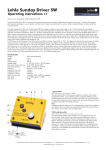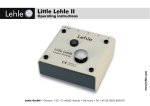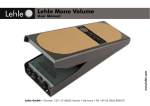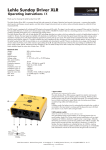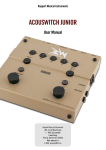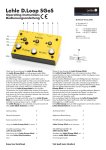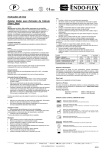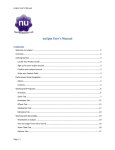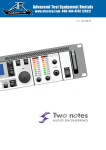Download Lehle Sunday Driver SW
Transcript
Lehle Sunday Driver SW www.lehle.com Operating instructions Lehle GmbH • Grenzstr. 153 • D-46562 Voerde • Germany • Tel +49 (0) 2855 850070 Dear Musician! Thank you for purchasing the Lehle Sunday Driver SW! I have been building units that switch, split and route signals with no technical compromises and with maximum musical fidelity since 1999. Your new Lehle Sunday Driver SW comprises only the very best components. Every assembly of your Lehle Sunday Driver SW has been made and tested in Germany. Your Lehle Sunday Driver SW is of extremely robust design and construction, to make sure that you get absolutely years and years of enjoyment from it. If you should nonetheless have a problem, or simply a question, just mail me or a member of the Lehle team at: [email protected] I wish you the very greatest pleasure and success using your Lehle Sunday Driver SW! Burkhard Georg Lehle Contents Introduction................................................................................................................................ 2 Technical data............................................................................................................................ 3 General description.................................................................................................................... 4 Typical uses - Lehle Sunday Driver SW as a cable driver...................................................................... 9 - Lehle Sunday Driver SW as a line driver....................................................................... 10 - Lehle Sunday Driver SW as a switch-in booster............................................................. 12 - Lehle Sunday Driver SW as a recording preamp........................................................... 13 - Lehle Sunday Driver SW as a recording preamp combined with the Lehle P-Split II.......... 15 - Lehle Sunday Driver SW as a preamp for mixer inputs.................................................. 17 Signal flow chart of the Lehle Sunday Driver SW.................................................................... 18 1 The Lehle Sunday Driver SW is a compactformat high-end preamp for all types of electrical and acoustic instruments - a preamp that enables electric guitars and basses, acoustic guitars, and also other stringed instruments (such as violins, cellos and double basses) to realize all of their musical potential. The Lehle Sunday Driver SW, with its highquality JFET technology, provides two operating modes. In mode D for “Driver” (switcher pressed), the input signal is amplified with zero modification, to eliminate the signal loss that long cable routings and/or effects chains can cause. The signal remains powerful and clear, and retains its dynamics. Mode S for “Sunday” (switcher not pressed) multiplies the input impedance by four, bringing out previously inaudible details and, as gain increases, imparting to the guitar a characteristic and unmistakable warmth. There is no distortion at any stage, and the signal always stays clean, even at a maximum gain setting of 15 dB. Thanks to its studio-standard signal-to-noise ratio of better than -100 dB, the Lehle Sunday Driver SW is totally free of background noise. To 2 exploit the dynamics of tube amplifiers to the full, the input voltage is also rectified from the power supply socket, then filtered, stabilized and doubled to 18V. In OFF status, the Lehle Sunday Driver SW provides two different modes of operation - in TB for “True Bypass” mode, the input and output are linked with zero losses to one another via a switch with gold-plated contacts. TB mode is the best option for a small setup with short cable routings and with a treble booster or a classical fuzz pedal is looped in after the Lehle Sunday Driver SW. The line driver function, located at the start of the train or in an effect chain, is the better solution for long cables and for complex effect board configurations. Switch the Lehle Sunday Driver SW to TS for “True Sound” mode, and it is active as a buffer, without amplifying or modifying the signal in any way. In this mode, the Lehle Sunday Driver SW operates as a totally neutral line driver. The Bypass mode option enables the Lehle Sunday Driver SW to integrate ideally into any setup, whether as a battery-operated stand-alone unit, or in an existing pedal board, not only on a sunday, but any other weekday, too. Technical data Weight: Length: Width: Overall height: Voltage range: Max. power battery take-up: Frequency response: Distortion: Impedance, Input D: Impedance, Input S: Impedance, Output: Signal-to-noise ratio: Max. level: Max. gain: 378 g (without battery) 9 cm 9.6 cm 4.8 cm 9 - 20 V AC or DC, or 9V PP3 battery 9 mA (OFF), 28 mA (ON) 20 Hz - 100 kHz (in mode D) 0.001 % at 1kHz, 0 dBU 1 MOhm 4 MOhm 150 Ohm -105 dB at 1kHz, 0 dBU (A-weighted) 5.7 V RMS (approx. 17 dBU) 15 dB 3 General description 4 1. Input socket Connect your instrument to this socket. The Lehle Sunday Driver SW processes signals from electric and acoustic stringed instruments, such as electric guitars and basses, Western guitars, classical guitars and all kinds of stringed instruments. This compact preamp has no trouble balancing out low signal levels, and eliminating sound losses caused by long cables and treble pickups. Note: In battery mode, the battery circuit is automatically activated when a cable is connected to the input socket so always pull the plug when you’ve finished your session or you want to take a longer break! 2. S/D-selector switch Use this switch to select the sound mode you want. This gold-plated-contact switch enables you to change between the two sound modes. Mode D for “Driver” (switcher pressed) selects neutral amplification, and the incoming signal is amplified at the input impedance of a guitar amp, of 1 MOhm, efficiently eliminating sound losses caused by long cables and/or effects cascades. The signal remains strong and clear, and retains its dynamics. In mode S for “Sunday” (switcher not pressed), the input impedance is multiplied by four, to 4 MOhm, making previously unsuspected details suddenly audible and imparting an unmistakable and characteristic warmth to the sound when the gain knob is turned up. 3. TS/TB-selector switch Use this switch to select the bypass mode you want. In OFF status, the Lehle Sunday Driver SW provides two different modes of operation - in TB for “True Bypass” mode, the input and output are linked with zero losses to one another via a switch with gold-plated contacts. True Bypass mode (switcher pressed) is the best option for a small setup with short cable routings and for when a treble booster or a classical fuzz pedal is looped in after the Lehle Sunday Driver SW. The line driver function, located at the start of the train or in an effect chain, is the better solution for long cables and for complex effect board configurations. Switch the Lehle Sunday Driver SW to TS 5 for “True Sound” mode, and it is active as a buffer, without amplifying or modifying the signal in any way. In this mode, the Lehle Sunday Driver SW operates as a totally neutral line driver – equivalent to Mode D with the gain pot turned all the way to the left. 4. Output socket Connect your target device here. For instance, an amplifier, a mixer panel, a stagebox or a soundcard. 5. External power supply Connect a power-pack for a voltage of 9 to 20 V here, when needed. The Lehle Sunday Driver SW can be operated optionally with a 9 V PP3 (block) battery or from an external power supply, which should provide not less than 9 and not more than 20 Volts. Polarity is not important here, and both AC and DC sources can be used. The supply voltage is internally rectified, filtered, stabilized and then doubled to 18 V. A connector for the Lehle Sunday Driver SW’s power-supply socket is included in the pack; if desired, this connector can also be 6 soldered on to your power-pack mains cable. The cover must be unscrewed and removed to permit installation of a 9V (PP3) block battery. To do this, simply unscrew the four screws holding the cover, and draw the cover off. Note: The Lehle Sunday Driver SW automatically switches via a gold-plated-contact relay to battery operation if power supply voltage drops below 9 Volt. So always make sure that the Lehle Sunday Driver SW has a charged battery if you want the extra security of knowing that it will continue to operate trouble-free even if the power supply fails. 6. Switching-state LEDs If the LED is showing red, the gain controller and S/D-selector switch are active. The high-intensity LEDs under the lenses clearly indicate the switching-state, even under stage lighting. A green LED will illuminate to show Bypass mode, if you’re using the Lehle Sunday Driver SW with a power pack. If you now press the foot switch (8), the color of the LED will change to red. When you’re operating on batteries, the LED only shows red. No LED illuminates during Bypass mode, so your batteries will last longer. to balance out sound losses that can occur when long cables or effects cascades are used. 7. Gain controller Use the gain controller to adjust the intensity of the preamp from a slight refresh sound level up to a powerful boost. The gain control knob consists of black anodized aluminium and is recessed into the housing. It can be easily turned by placing your fingertip in the top depression, with the great advantage that, thanks to the recessed design, the setting cannot be inadvertently disturbed on stage or during transportation. The Lehle Sunday Driver SW with its JFET-based circuitry performs two functions simultaneously, reducing signal impedance, on the one hand, and boosting the signal, on the other. The Lehle Sunday Driver SW as a booster: A buffer starts to amplify the signal when the gain controller is turned further in the clockwise direction. Tube amplifiers, preamps and distortion pedals can thus be driven slightly beyond the limit. To make sure that the resultant overdrive distortion sounds harmonious, the Lehle Sunday Driver SW in S mode amplifies less treble as boost rises. The result can range from a pleasant sound, with no shrillness, up to a silky warm, harmonious overdrive distortion on tube amplifiers. The Lehle Sunday Driver SW as an impedance converter: When the gain controller is at the left-hand stop (in the 0 or seven o’clock position), it operates purely as an impedance converter. With the knob in this position, the sound is refreshed, in order 8. True Bypass switch Use this switch to select the original or the signal with more gain. This button activates a Bypass switch with goldplated contacts inside the Lehle Sunday Driver SW, via a virtually indestructible switch mechanism. In OFF status, the Lehle Sunday Driver SW provides two different modes of operation, the TB for “True Bypass” and the TS for “True Sound” mode. In ON state, the LED (6) shows red, 7 the gain controller is active and you can choose between the sound modes D for “Driver” and S for “Sunday”. 9. Base and fixing You can use the fixing screws supplied with the Lehle Sunday Driver SW to fix it to a base plate (or to a pedal board, for example). Tip: in case you prefer a velcro solution for your pedalboard we recommend to write down the serial number of the pedal before covering it for eventual support matters. 8 Thanks to its ready-to-go fixing system, the Lehle Sunday Driver SW can be mounted without difficulty on a base plate. To do this, undo the four housing screws and detach the cover. Then fix the device base to a base plate using the two screws, the washers and the spacers supplied. Replace the cover and tighten the four housing screws - done! Typical uses The Lehle Sunday Driver SW universal properties make it equally suitable for live use on stage and in the concert hall, and for studio recording sessions. The following few pages show a number of typical applications in which the Lehle Sunday Driver SW is a rational addition to your gear! The Lehle Sunday Driver SW as a cable driver Live Long cable runs and complex effects cascades on stage or in the concert hall can cause sound losses from the signal. Where electric guitars are used with tube amplifiers, an additional boost is often necessary, to generate a harmonious distortion. The Lehle Sunday Driver SW is designed to perform both tasks perfectly. The use of long connecting cable runs on stage involves the danger of significant and audible losses of sound quality. You can eliminate such losses by positioning the Lehle Sunday Driver SW as a cable driver in the signal path directly after your instrument. The Lehle Sunday Driver SW has a low-impedance output in the TS for 9 “True Sound” mode (3), which is thus insensitive to sound losses caused by over-long cable runs. The signal sustains the full sound quality even at cable runs of 20 meters and more. The Lehle Sunday Driver SW as a line driver Device connection Input (1) Instrument Output (3) Amplifier (long cable) What to do: 1. Connect your instrument to the Input socket (1) of the Lehle Sunday Driver SW. 2. Connect a long cable from the Send socket (3) of the Lehle Sunday Driver SW to the amplifier input. 3. Switch the S/D selector (2) in the S position, for “Sunday“. 4. Turn the Gain controller (7) as much to the right till you hear the sought of sound that is exactly what you wanted. 5. Done! 10 Electric guitarists and bassists like to use a large range of effects switched one after the other, to get exactly the sound they want. There is, however, a danger here that the signal will lose clarity, treble and pressure significantly due to the array of effects. With long cable runs and the large number of contact crossings on connectors and sockets, these sound loss can even occur if the effects pedals are equipped with a True Bypass. It’s easy to get an idea of how much sound you’re losing – firstly connect your instrument directly to the amplifier, and then via the effects rig up. This sound loss can be eliminated by positioning your Lehle Sunday Driver SW as a line driver before the effects cascade in the signal path. Device connection Input (1) Instrument Output (3) Input of the first effect device in the chain What to do: 1. Connect your instrument to the Input socket (1) of the Lehle Sunday Driver SW. 2. Connect the first effect device in the serial chain to the Send socket (3) of the Lehle Sunday Driver SW. 3. Switch the S/D selector (2) in the D position, for “Driver“. 4. Turn the Gain controller (7) to the left limit (“7 o’clock position“). 5. Done! Notes: The sound characteristics of some effects (e.g. Treble Booster, Fuzz, Vintage Chorus and Vintage Echo) may be modified by positioning the Lehle Sunday Driver SW before them in the line. The remedy in such cases is to use the TB for “True Bypass” mode (3) when the Lehle Sunday Driver SW is in the OFF state. Hum loops occurring between individual effects from the effects cascade, or also in conjunction with an amplifier, can be eliminated by using a Lehle P-Split II, which, thanks to the Lehle LTHZ high end transformer, guarantees electrical isolation of the signal. 11 The Lehle Sunday Driver SW as a switch-in booster the different volumes of two instruments. With a low gain setting, the sound generated is pleasant, with absolutely no shrillness, whereas an increasing gain level results in a silky-warm, harmonious overdrive distortion in combination with tube amps. Device connection Input (1) Instrument Output (3) Amplifier The Lehle Sunday Driver SW can be used as a booster to provide your sound with rather more pressure and presence on stage. This is interesting in a number of ways, particularly, for example, if you want to increase volume for your solo at the push of only one button, or if you want to balance 12 What to do: 1. Connect your instrument to the Input socket (1) of the Lehle Sunday Driver SW. 2. Connect a long cable from the Send socket (3) of the Lehle Sunday Driver SW to the amplifier input. 3. Switch the S/D selector (2) in the D position, for “Driver“. 4. Turn the Gain controller (7) to the left limit (“7 o’clock position“). 5. Done! In the studio The Lehle Sunday Driver SW gives top performances not only on stage and in the concert hall, but also in the recording studio. Its wide 20 to 100,000 Hz transmission range and extremely good signal-to-noise ratio makes it the ideal recording preamp. The Lehle Sunday Driver SW as a recording preamp PCs featuring either integrated or external sound cards, and even Digital Audio Workstations (DAWs), in many cases lack the high-impedance instrument input necessary for direct recording from an instrument. Connecting the instrument to the standard line input of such devices generally 13 fails, because the instrument’s signal level is too low. The result is significant sound discoloration, due to the incorrect input impedance of the line input. Here, you can use the Lehle Sunday Driver SW to amplify your instrument’s sensitive signal via the Lehle Sunday Driver SW’s high-impedance input to make the signal low-impedance and thus compatible with your sound card or DAW, while all the time retaining your instrument’s original sound. Device connection Input (1) Instrument Output (3) Mixer input, PC, Stagebox etc. What to do: 1. Connect your instrument to the Input socket (1) of the Lehle Sunday Driver SW. 2. Connect your recording preamp to the Output socket (3) of the Lehle Sunday Driver SW. 3. Switch the S/D selector (2) in the D position, for “Driver“. 4. Adjust the Gain controller (7) so that the signal 14 is optimal for your recording equipment. 5. Done! Tip: If you want to re-amp a signal recorded dry, connect the Lehle P-Split II to your sound card or DAW for the mix, reduce the volume on the sound card or DAW a little, and connect the ISO output of the Lehle P-Split II to an amplifier. The Lehle Sunday Driver SW as a recording preamp combined with the Lehle P-Split II It can be useful during a recording session to hear your instrument via an amplifier simultaneously, while recording. This enables you to play your instrumental part with your accustomed sound, while your dry signal is recorded, a technique that has positive benefits for performance feel, and therefore also for the recording. Combination of the Lehle P-Split II and the Lehle Sunday Driver SW makes this method possible - connect the output from the Lehle Sunday Driver SW to the input of the Lehle P-Split II; then connect your amplifier to the DIR socket and the sound card or DAW to the ISO output. 15 Device connection Lehle P-Split II: Input Output (3) of the Lehle Sunday Driver SW DIR socket Amplifier ISO socket Mixer input, PC, Stagebox etc. Lehle Sunday Driver SW: Input (1) Instrument Output (3) Input socket of the Lehle P-Split II What to do: 1. Connect your instrument to the Input socket (1) of the Lehle Sunday Driver SW. 2. Connect the Output socket (3) of the Lehle Sunday Driver SW with the Input socket of the Lehle P-Split II. 3. Connect your amplifier to the DIR socket of the Lehle P-Split II. 4. Connect your recording preamp to the ISO socket of the Lehle P-Split II. 16 5. Switch the S/D selector (2) of the Lehle Sunday Driver SW in the D position, for “Driver“. 6. Adjust the Gain controller (7) so that the signal is optimal for your recording equipment. 7. Done! Note: The Lehle P-Split II also has other functions as, for example, inverting the phase at the “ISO“ output or an extra galvanic separation of the signal to get rid of ground-loop noise. Please read the Lehle P-Split II operating manual for a precise explanation of the use and effects of those features. The Lehle Sunday Driver SW as a preamp for mixer inputs like those used on acoustic instruments, are also too weak for the line inputs of a mixer. As in the case of recording, the Lehle Sunday Driver SW is again an ideal tool here, for making a high-impedance instrument signal into a lowimpedance instrument signal and amplifying it adequately for the line input of a mixer. The Lehle Sunday Driver SW, with its input impedance of 1 MOhm (or 4 MOhm in S mode) amplifies the sensitive signal of such instruments so that their sound arrives at the mixer totally true to the original and complete with all its details. Device connection Input (1) Instrument Output (3) Mixer input, PC, Stagebox etc. Due to their input impedance of approx. 10 KOhm, the line inputs on mixers are not suitable for level-matched recording of high-impedance signals from magnetic pickups (e.g. the single coil and humbucker pickups on guitars and electric basses). The signals from piezo pickups, What to do: 1. Connect your instrument to the Input socket (1) of the Lehle Sunday Driver SW. 2. Connect your mixer to the Output socket (3) of the Lehle Sunday Driver SW. 3. According to the sensitivity of the connected 17 instrument, switch the S/D selector (2) in position D or S. 4. Adjust the Gain controller (7) so that the signal is optimal for your mixer. 5. Done! Tip: In S mode and with a gain setting of between 11 and 12 o’clock or more, instruments with piezo pickups, which can sometimes sound very harsh and shrill, take on a pleasantly warm and silky tone. Signal flow chart of the Lehle Sunday Driver SW 18




















